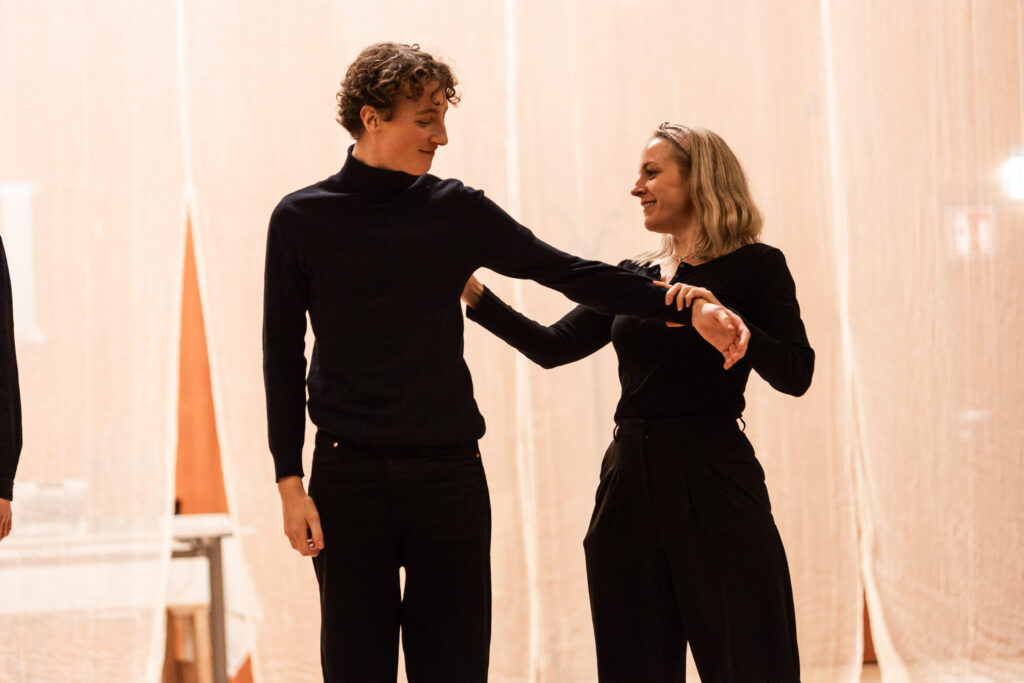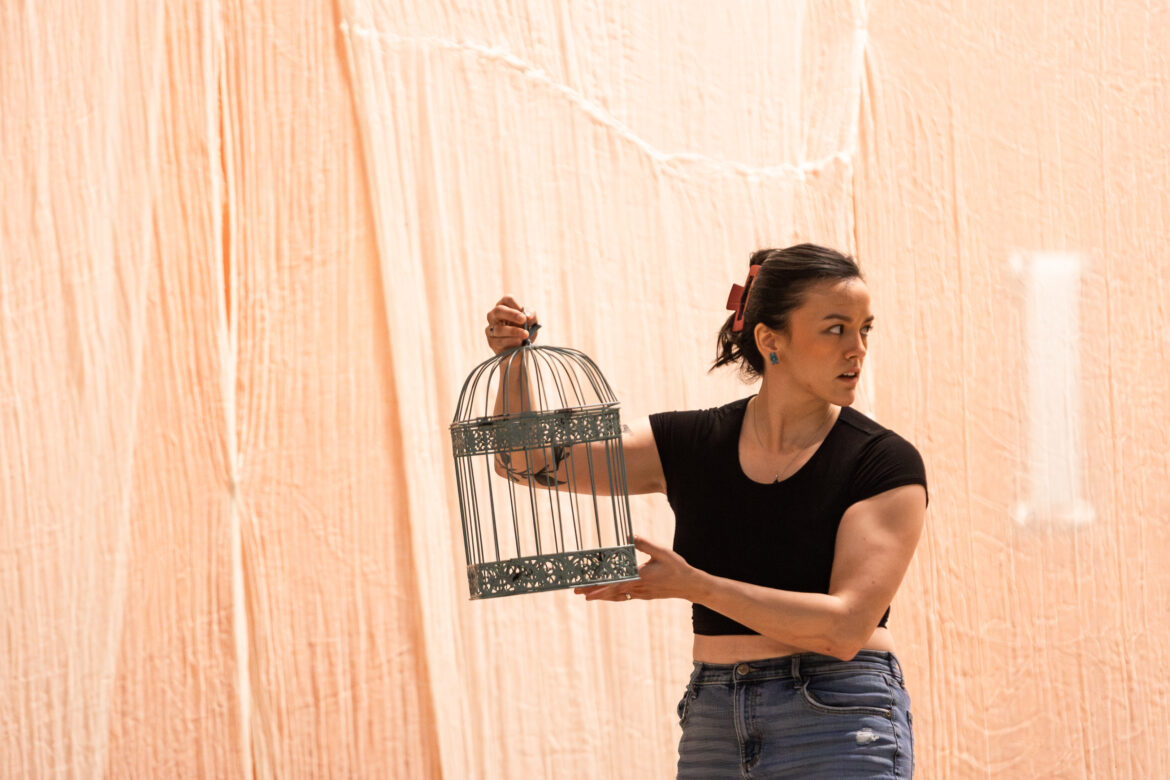producer’s note on specters
By Michel Büch
Our double bill Specters: Trifles and The American Dream examines how naturalized assumptions about property rights, monogamy, and familial structures buttress and engender systemic emotional and physical violence. We selected Trifles by (Susan Glaspell, 1916) and The American Dream (Edward Albee, 1961) for their enduring relevance and the ways they mirror contemporary issues with eerie precision. We asked: how have the critiques of ownership, gender, and family in these plays carried forward into our present? In what guises, under which banners, to whose benefit, and in what kind of social grammar are they articulated today? We chose the title ‚Specters‘ because it reflects how these social and political issues still haunt us in different ways today. However, considering the political success of Donald Trump’s Republican Party and the rise of authoritarian politics across the globe, our production feels both timely and disturbingly outdated. Trump’s (re-)election and the campaign leading up to it have made one thing clear: we are now facing the rhetoric and political aims from the past under no guise whatsoever.
Trifles presents a historical moment when women’s political agency was an aspiration, a time when women were excluded from public realms of power and decision-making. The play negotiates their political agency in a domestic sphere of presumed innocence. The emotional repercussions of this configuration are a driving force of the play. Four years before the ratification of women’s national suffrage (1920), women were a „protected class“ with limited legal and no political agency. In 2024, this remains disturbingly relevant. A majority of U.S. voters now support a president-elect—at the time of writing, the inauguration taking place on our opening night—who declares he will “protect women whether they like it or not,” poorly cloaking control and transgression as, at best, a perverted form of care.
The domestic sphere is not apolitical but remains a battleground where women’s agency is negotiated and politically constrained at once.
Trump’s first presidency culminated in the dismantling of nearly 50 years of federal constitutional protection for abortion established by Roe v. Wade. His administration’s rollbacks of Title IX made it more difficult for women to seek justice for sexual harassment and assault on college campuses. We all remember his “locker room talk”—a phrase both troubling and symptomatic of the commonplace trivialization of transgressive male behavior against women’s bodies. Our production of Trifles serves as a powerful reminder that the domestic sphere is not apolitical but remains a battleground where women’s agency is negotiated and politically constrained at once.

Edward Albee’s The American Dream critiques the grotesque identities forged within the idealized nuclear family (housewife, children, male breadwinner) and interrogates capitalism’s reshaping of family roles and personal fulfi llment. Zooming in on adoption as an emblem of social adaptability under capitalism, Albee exposes the cracks in the façade of meritocracy, revealing deeper emotional and relational voids—a theme reflected in the visual design of this production’s poster. Today, these themes echo in proposals for differential voting rights based on family structure, with a vice president-elect suggesting to link voting power with the number of children one has—specifically targeting „childless cat ladies.“ Alongside this, the lucrative adoption industry (mirroring the commodification of human lives and a racially stratified valuation of individuals) and the instagrammable, monetizable #tradwife movement are but two examples that underscore how violent capitalist and conservative ideologies inflect contemporary structures of feeling today. Other essays in this issue discuss these in more detail. As a side note, Putin has outlawed any „propaganda in favor of a childfree lifestyle“ in Russia, while in Germany, the AfD demands a „Willkommenskultur für Neu- und Ungeborene.“
So rather than simply asking how things have changed or stayed the same, Specters challenges us to reconsider what we have been calling “progress” in the first place. As the plays in this production address female agency and capitalism’s effects on emotional bonds and familial relationality, we should be asking, what kind of progressive liberalism has been in existence, seeing how easily it has been exposed as a mask for continued racist and sexist capitalist exploitation? We would have to consider the primal scene of US capitalist expansion and reckon with European settlers’ appropriation of American land, putatively making it theirs by slaughtering the indigenous peoples and by, in John Locke’s words, “the labour of [their] body, and the work of [their] hands,” except that they were neither their own bodies nor their own hands. We would need to address the foundational anti-Blackness, the specters of those bodies that have fueled, animated, and sustained capitalism as both currency and labor from its earliest stages and, in many forms, still do. This is particularly significant in view of what is posited as „family.“
So rather than simply asking how things have changed or stayed the same, Specters challenges us to reconsider what we have been calling “progress” in the first place.
Life on the plantation compelled the enslaved to forge emotional bonds and modes of expression within aff ective and linguistic registers entirely distinct from the white families that owned them. What sort of family concepts apply, when we acknowledge planters raping the enslaved on a regular basis? How do we imagine motherhood when, under the partus sequitur ventrem doctrine, a child does not legally belong to the mother, and both are denied the legal capacity to even own themselves? The forms of families that emerged in these spheres defined by continual disruptive and abjective violence have been unintelligible to the white majority by default.

Toni Morrison’s Pulitzer Prize-winning novel Beloved exemplifies an effort to articulate forms of belonging and attachment shaped by the legacies of enslavement, configuring the main character Sethe’s murder of her child as an act of impossible agency and care. Hortense Spillers’ seminal essay Mama’s Baby, Papa’s Maybe delves deeply into how the white, normative ideal of the U.S. American family fails to account for family formations of those racialized as Black—other than abjectively denouncing them to a supposed (and perpetually suspended) state of lack. The lived reality of alternative family formations, however, expose the constructed nature of the white, heteronormative family as the standard default. The ongoing violent negation of Black or queer family structures as „real“ families betrays an underlying anxiety—a precariousness in the very construct itself.
The current political trajectory will not stop at the limitations on women’s political agency or their bodily autonomy already in place but will continue to expand the liberal authoritarianism we have been promised. Anti-women violence and racist dehumanization—“specters“ only for those unaffected—have solidified into undeniable, concrete forces for everyone to see. We are facing the reality that the ideals of freedom, equality, and justice not only remain unfulfilled aspirations—an inherent part of being a dream. They have also been complicit in perpetuating a long-standing status quo, one built on the exploitability, disposability, and commodification of human lives.
They are specters no more.
Photo (c) Irina Starkova


Schreibe einen Kommentar